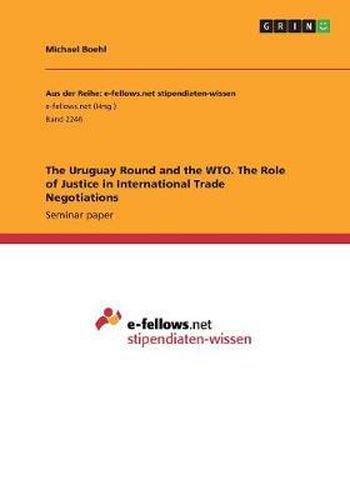Readings Newsletter
Become a Readings Member to make your shopping experience even easier.
Sign in or sign up for free!
You’re not far away from qualifying for FREE standard shipping within Australia
You’ve qualified for FREE standard shipping within Australia
The cart is loading…






Seminar paper from the year 2005 in the subject Politics - International Politics - Topic: International Organisations, grade: 1.7, University of Tubingen (Institut fuer Politikwissenschaft), course: International Relations (Seminar), language: English, abstract: This essay’s general interest is in whether international trade institutions comply with a sense of justice. Concretely speaking, it is to be analysed whether the outcome of a specific international trade negotiation, namely the Uruguay Round, which lasted from 1983 to 1994, is to be judged as just or unjust. Fulfilling this task, this essay at first displays a concept to define the very abstract term of justice. The regarded definition will be mainly according to Cecilia Albin. The second part of this essay provides a summary of main features of the Uruguay Round’s final act, the Agreement on Agriculture (AoA) and the Agreement on Trade-Related Aspects of Intellectual Property Rights (TRIPS). Although other sections of the agreement are highly interesting, too, these two fields prove to be extraordinarily useful for this paper’s purpose. Nevertheless it is the my intention to point on other issues of interest for instance labour standards or the further development since 1994 in this essay where it seems helpful and possible. The chapter summarizing the Uruguay Round’s outcome is mainly based on World Trade Organisation (WTO) sources, to insure that no subliminal judgement is included or at least none already supporting the view of the later discussed criticism. The third section analyses the Uruguay Round’s outcome concerning agriculture and intellectual property. The criticism is derived from economic authors like Dasgupta and Sander/Inotai and development orientated NGOs like OXFAM as well. In most cases the analysis is critical of the agreement, at the same time avoiding the word justice. This gap shall be filled by the author’s assessment of the criticism, judging it, and linking it explicitly
$9.00 standard shipping within Australia
FREE standard shipping within Australia for orders over $100.00
Express & International shipping calculated at checkout
Seminar paper from the year 2005 in the subject Politics - International Politics - Topic: International Organisations, grade: 1.7, University of Tubingen (Institut fuer Politikwissenschaft), course: International Relations (Seminar), language: English, abstract: This essay’s general interest is in whether international trade institutions comply with a sense of justice. Concretely speaking, it is to be analysed whether the outcome of a specific international trade negotiation, namely the Uruguay Round, which lasted from 1983 to 1994, is to be judged as just or unjust. Fulfilling this task, this essay at first displays a concept to define the very abstract term of justice. The regarded definition will be mainly according to Cecilia Albin. The second part of this essay provides a summary of main features of the Uruguay Round’s final act, the Agreement on Agriculture (AoA) and the Agreement on Trade-Related Aspects of Intellectual Property Rights (TRIPS). Although other sections of the agreement are highly interesting, too, these two fields prove to be extraordinarily useful for this paper’s purpose. Nevertheless it is the my intention to point on other issues of interest for instance labour standards or the further development since 1994 in this essay where it seems helpful and possible. The chapter summarizing the Uruguay Round’s outcome is mainly based on World Trade Organisation (WTO) sources, to insure that no subliminal judgement is included or at least none already supporting the view of the later discussed criticism. The third section analyses the Uruguay Round’s outcome concerning agriculture and intellectual property. The criticism is derived from economic authors like Dasgupta and Sander/Inotai and development orientated NGOs like OXFAM as well. In most cases the analysis is critical of the agreement, at the same time avoiding the word justice. This gap shall be filled by the author’s assessment of the criticism, judging it, and linking it explicitly